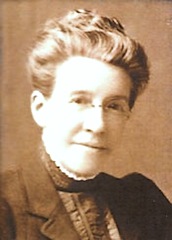The Leading of the Lord
A Spiritual Autobiography
I was brought up in the very heart of the religious life of Wales, for my grandfather was a Welsh Divine, well known throughout the Principality in his day; and my father’s house was a rendezvous for the ministers as they passed hither and thither on their Master’s work. My childhood’s memories gather round their visits and the great meetings of the Sunday-schools, when often I sat as a tiny child in the midst of the grave elders in the “big pew” listening with intense interest to the “hwyl” of the minister. “The mercy of the Lord is … unto children’s children”; but as it often is with children brought up in the midst of religious surroundings, the true inward change of heart did not come until I had married and moved away to England. Then it occurred without the aid of any human instrument, but the day – New Year’s Day- and the hour are imprinted on my mind.
Only a deep, inward desire to know that I was a child of God; a taking down of my (too little read) Bible from the shelf; a turning over the leaves, and the eye falling on the words, “The Lord hath laid on Him the iniquity of us all”; again, a casual turn of the sacred pages, and the words, “He that believeth hath eternal life. A quick facing out whether I did believe that God had laid my sins upon the Lamb of God on the Cross; a pause of wonderment that it really said that I had eternal life if I simply believed God’s Word; a quick cry of “Lord I do believe” – and one more soul had passed from death to life, a trophy of the grace of God, and the love of Him Who died. The Spirit of God instantly bore witness with my spirit that I was a child of God, and deep peace filled my soul.
The beginning of “Leading of the Lord”
By Jessie Penn Lewis
Written for “The Christian” in 1903
